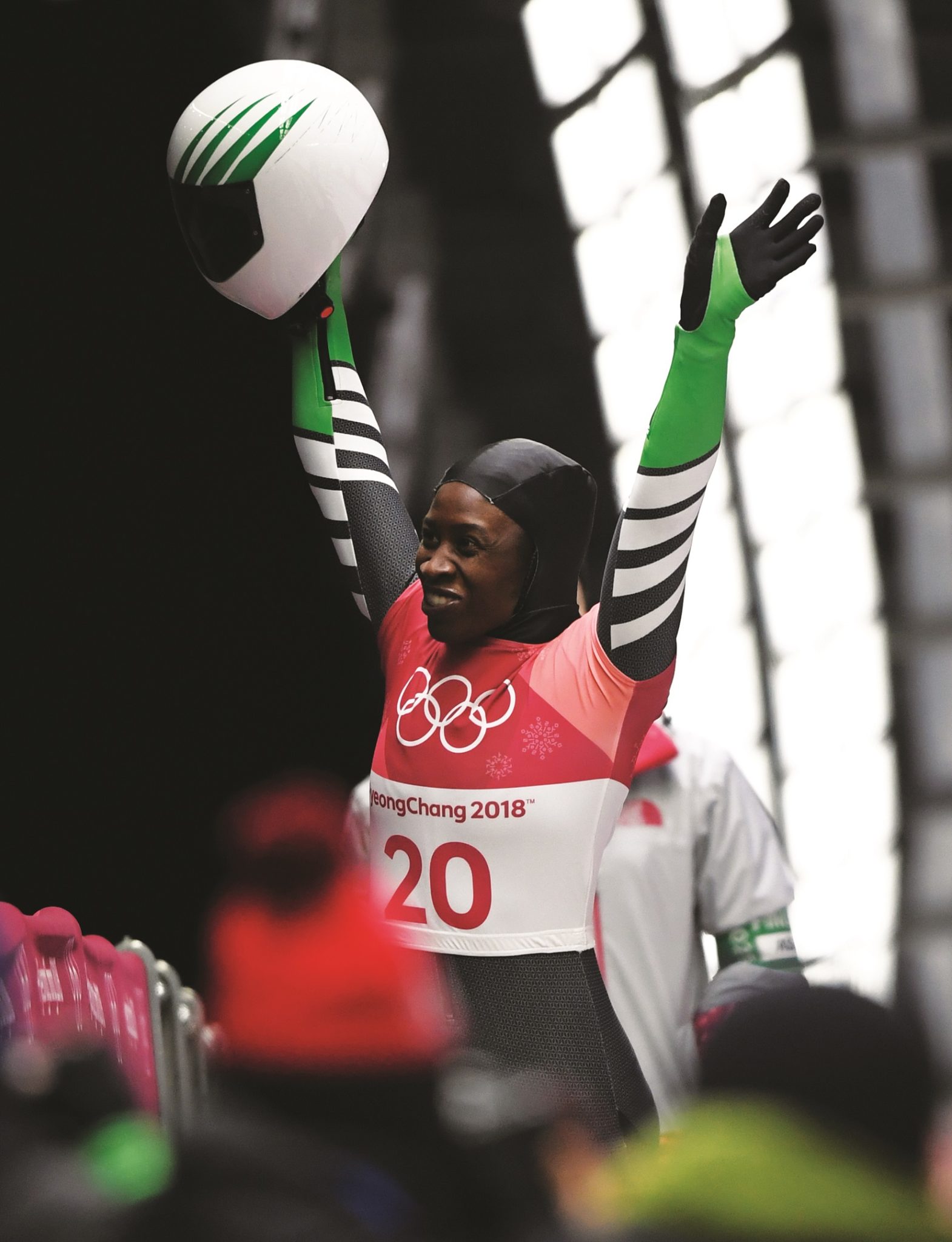Simidele Adeagbo, the first Nigerian Winter Olympian at PyeongChang 2018 and the first African and black female skeleton racer at the games, is using the sport to uplift other young women.
In 2008, Simidele Adeagbo was determined to qualify for the Beijing Olympics. Every muscle, every cell, in her body was tuned and trained to accomplish this dream.
A place at the world sporting event would be a culmination of a decade of sweat and tears in athletics, a journey she began while in elementary school.
The catalyst was winning a race at school that propelled Adeagbo to become a four-time National Collegiate Athletic Association (NCAA) champion as well as the triple jump record-holder for the University of Kentucky.
Adeagbo put everything she could into her Olympic dream but destiny made her fall short, literally. She failed to qualify for the Olympics by eight inches and just like that, it was all over.
“I went all out and I put everything I could into qualifying. I worked with the best coaches and best facilities. I had two good tries and I just came up short. Of course I was disappointed but I was satisfied with my effort and at that point, I was ok with moving on in life and walking away from athletics,” says Adeagbo.
She moved to South Africa to begin her new life away from competitive athletics until December 2016 when things took on a new course.
Nigerian women’s bobsled team members Seun Adigun, Ngozi Onwumere and Akuoma Omeoga made news headlines with an audacious goal to become the first team from Africa to qualify for the winter Olympics.
“As I was reading it, I felt really inspired and excited and I thought it was really cool. So something inside me rose up and I thought I wonder if it could be something I could be a part of?” recalls Adeagbo.
The bigger picture for Adeagbo was recognizing how significant it would be to make history as part of the Nigerian team, however the initial days of training were anything but smooth. She tried out for the team in August 2017 and was subsequently invited to come back to a camp in Canada.
“That was when I realized that bobsleigh wasn’t going to work out. The timing was not right to join the team. The team was already made.”
But before her Olympic hopes would be crushed again, someone introduced Adeagbo to skeleton-racing, a winter sliding sport in which a person rides a small sled, known as a skeleton bobsled, at speeds of about 90 miles per hour.
“I tell people to imagine a frozen water slide because that is kind of similar to what it might be like. The tracks are about a kilometer to a kilometer-and-half long. Depending on the track, it generally takes anywhere from 50 seconds to a minute to finish the race. Sometimes, when I am driving down the highway, I realize I am going slower down the freeway than I am on my skeleton sled driving down the track,” says Adeagbo.
The track has a number of twists and turns and the goal is to get down as quickly as possible, with the fastest person declared winner.
“Your face is usually about an inch from the ice at any given point in time. The irony of the sport is you are on the edge of danger and control at any given point in time. The best way to be in control is to be relaxed,” says Adeagbo.
Adeagbo started training as a skeleton racer in September 2017 and in 2018, became the first Nigerian to compete at the Winter Olympics in February and the first black woman to compete in the sport.
“It was an amazing accomplishment knowing that nobody had done it before and it just spoke to the possibilities out there. I was filled with pride when I qualified and knowing all the hard work that had gone into it, not only the four months before the Olympics but everything I had worked hard for during my track and field days, contributed to that moment,” recalls Adeagbo.
It’s her zeal to step out of the comfort zone that makes her successful today even if it means playing the role of a body double for one of her sports heroes, Serena Williams.
“That was an interesting opportunity, I got discovered one day when I was at work. Someone came to me and asked if I would like to audition for the role. I auditioned and that was really cool playing Serena for that day,” recalls Adeagbo.
READ MORE: Full List: The World’s 50 Most Valuable Sports Teams 2017
Besides sport, Adeagbo is paving the way for Africa’s youth by inspiring the next generation of girls in Nigeria through a master class developed by the Youth Empowerment and Development Initiative (YEDI).
As she puts it: “I am passionate about helping people with my God-given gifts and talents, and to inspire people to enjoy the gift of athleticism and achieve their fullest potential.”
It took 20 years for Adeagbo to achieve her dream of qualifying for the Olympics and with everything she learned on that ride, her goal is to encourage Africa’s youth to never give up on their Olympic-sized dreams – no matter what.
